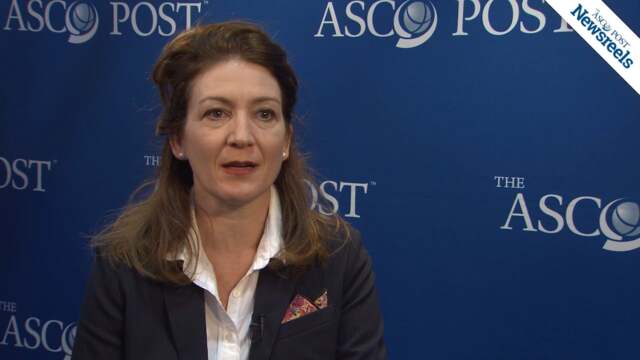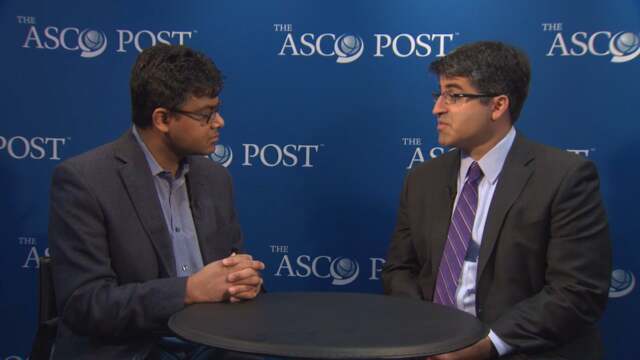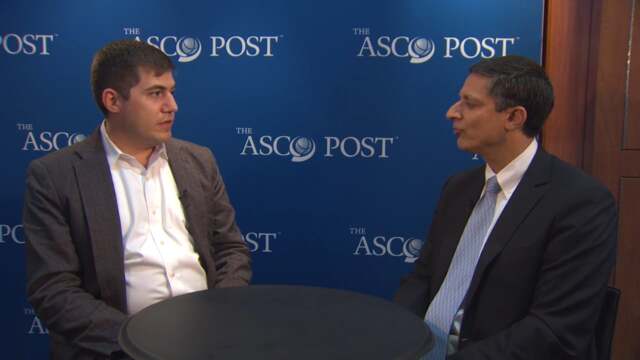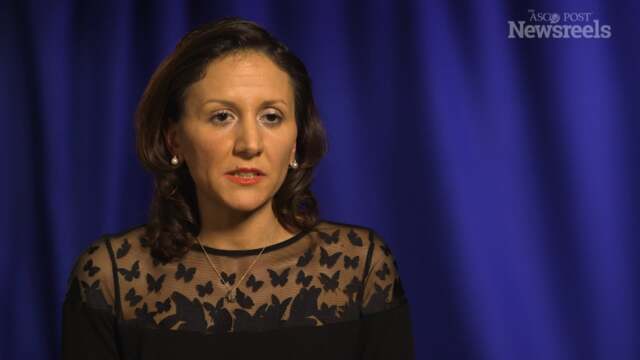Circulating Tumor DNA Profiling Identifies Clonal Evolution Patterns and Permits Classification of Tumor Subtypes in DLBCL
In a study reported in Science Translational Medicine, Florian Scherer, MD, David M. Kurtz, MD (Conquer Cancer Foundation Young Investigator), Aaron M. Newman, PhD, and colleagues from Stanford University found that analysis of circulating tumor DNA (ctDNA) permits identification of patterns of...
Expert Point of View: Stephen Ansell, MD, PhD
Stephen Ansell, MD, PhD, Chair of the Mayo Clinic Lymphoma Group, said the “exciting results” of these studies indicated that “we have come a long way in Hodgkin lymphoma.” “It’s been very gratifying to see that the excellent initial trial results with the anti–programmed cell death protein 1...
Studies Advance the Use of PD-1 Blockade in Classical Hodgkin Lymphoma
Classical Hodgkin lymphoma is one of the malignancies most susceptible to treatment with monoclonal antibodies targeting the programmed cell death protein (PD-1). Nivolumab (Opdivo) has been approved by the U.S. Food and Drug Administration (FDA) for use in patients with relapsed/refractory...
Venetoclax Studied in Relapsed or Refractory Non-Hodgkin Lymphoma
The BCL-2 inhibitor venetoclax (Venclexta) was found to be active in patients with relapsed or refractory non-Hodgkin lymphoma (NHL), according to a phase I study reported by Davids et al in the Journal of Clinical Oncology. Further study of this agent, including in combination therapy to augment...
Low Loss of Residual Lifetime for Patients With DLBCL in Remission Who Were Event-Free 24 Months After Treatment
In a Danish population–based study reported in the Journal of Clinical Oncology, Jakobsen et al found that patients with diffuse large B-cell lymphoma (DLBCL) in first remission and event-free at 24 months after treatment have a low loss of residual lifetime compared with the general...
Selected Abstracts From the 2016 ASH Annual Meeting
Here are several abstracts selected from the proceedings of this year’s American Society of Hematology (ASH) Annual Meeting & Exposition, highlighting newer therapeutics in follicular lymphoma. For full details of these study abstracts, visit http://www.bloodjournal.org/content/128/22....
Expert Point of View: Anas Younes, MD
Anas Younes, MD, Chief of the Lymphoma Service at Memorial Sloan Kettering Cancer Center, New York, commented on the brentuximab vedotin (Adcetris)/nivolumab (Opdivo) combination studies, noting that complete response rates of 60% are “impressive.” “It seems that in the pretransplant setting, the...
Brentuximab Vedotin Plus Nivolumab Highly Active in Relapsed Classical Hodgkin Lymphoma
Response rates of 90% to 100% were achieved in early studies evaluating the combination of brentuximab vedotin (Adcetris) and nivolumab (Opdivo) in relapsed or refractory classical Hodgkin lymphoma. The findings were presented at the 2016 American Society of Hematology (ASH) Annual Meeting &...
CAR T-Cell Therapy KTE-C19 Appears Successful in Aggressive B-Cell Lymphoma
Chimeric antigen receptor (CAR) T-cell therapy continues to have impressive showings in patients with aggressive hematologic malignancies and no other good treatment options. Interim results of the pivotal phase II ZUMA-1 trial, the first multicenter trial of the experimental CAR T-cell therapy...
FDA Approves Ibrutinib in Relapsed/Refractory Marginal Zone Lymphoma
The U.S. Food and Drug Administration (FDA) today approved ibrutinib (Imbruvica) for the treatment of patients with marginal zone lymphoma who require systemic therapy and have received at least one prior anti–CD20-based therapy. Accelerated approval was granted for this indication based on...
Clonal Hematopoiesis of Indeterminate Potential at Time of ASCT May Be Linked to Adverse Outcomes in Lymphoma
In a study reported in the Journal of Clinical Oncology, Gibson et al found that clonal hematopoiesis of indeterminate potential at the time of autologous stem cell transplantation (ASCT) in patients with lymphoma was associated with an increased risk of poorer outcomes. Study Details In the...
Ofatumumab vs Rituximab in Salvage Therapy for Relapsed or Refractory Diffuse Large B-Cell Lymphoma
The final results of the international phase III ORCHARD study, reported in the Journal of Clinical Oncology by van Imhoff et al, showed no difference in progression-free survival with the addition of ofatumumab (Arzerra) vs rituximab (Rituxan) to cisplatin, cytarabine, and dexamethasone (O-DHAP vs ...
Expert Point of View: Lawrence Kaplan, MD
“This study is important because R-CHOP [rituximab and cyclophosphamide, doxorubicin, vincristine, prednisone] has been the standard of care for many years. CHOP, the chemotherapy backbone, has withstood challenges from more aggressive regimens in the past. The excellent clinical outcomes observed ...
Dose-Adjusted EPOCH-R No Better Than R-CHOP in Diffuse Large B-Cell Lymphoma
Long-awaited results of the Cancer and Leukemia Group B (CALGB)/Alliance 50303 trial were a disappointment to many hematologists/oncologists at the 2016 American Society of Hematology (ASH) Annual Meeting & Exposition. The study failed to show that dose-adjusted EPOCH-R (etoposide,...
Expert Point of View: Brad S. Kahl, MD
Speaking about the GALLIUM study in the ASH News Daily, Brad S. Kahl, MD, of Washington University School of Medicine, St. Louis, commented, “It is a potentially practice-changing study that clearly shows an 8% absolute improvement in progression-free survival at 2 years for the patients getting...
Obinutuzumab Prolongs Disease-Free Survival vs Rituximab in Follicular Lymphoma
Induction and maintenance therapies with obinutuzumab (Gazyva) were superior to rituximab (Rituxan) induction and maintenance in patients with untreated follicular lymphoma, according to results of the phase III GALLIUM study presented at the Plenary Session during the 58th American Society of...
‘Clinically Useful’ Findings for Brentuximab Vedotin in CTCL, Rituximab Maintenance in MCL
Positive studies about brentuximab vedotin (Adcetris) in cutaneous T-cell lymphoma1 and rituximab (Rituxan) maintenance therapy in mantle cell lymphoma (MCL)2 were reported at the 2016 Annual Meeting of the American Society for Hematology (ASH). “These abstracts each focus on approved agents and...
ASH 2016: Ibrutinib and TGR-1202 Combination Yields Encouraging Results in Patients With Relapsed Forms of Leukemia or Lymphoma
A combination of two targeted agents has demonstrated safety as well as encouraging signs of effectiveness in a phase I clinical trial in patients with relapsed or hard-to-treat chronic lymphocytic leukemia (CLL) or mantle cell lymphoma (MCL). Davids et al reported the findings at the 58th American ...
Robert E. Marcus, MD, on Follicular Lymphoma: Results From the GALLIUM Trial
Robert E. Marcus, MD, of Kings College Hospital, discusses study findings on obinutuzumab-based induction and maintenance in patients with previously untreated disease (Abstract 6).
Steven Le Gouill, MD, PhD, on Mantle Cell Lymphoma: Final Results From the LyMa Trial (French Language Version)
Steven Le Gouill, MD, PhD, of Nantes University Hospital and INSERM, discusses in French study findings from the Lysa/Goelams Group on rituximab maintenance after autologous stem cell transplantation in younger patients with mantle cell lymphoma (Abstract 145).
Catherine Thieblemont, MD, PhD, on DLBCL: Results From the Lysa Remarc Study (French Language Version)
Catherine Thieblemont, MD, PhD, of Hôpital Saint-Louis and INSERM, discusses in French phase III trial findings on lenalidomide maintenance in elderly patients with DLBCL treated with R-CHOP in the first-line setting (Abstract 471).
ASH 2016: KTE-C19 in Patients With Chemorefractory Primary Mediastinal B-Cell Lymphoma and Transformed Follicular Lymphoma
Immune cellular therapy is a promising new area of cancer treatment. Anticancer therapeutics, such as chimeric antigen receptor (CAR) modified T cells, can be engineered to target tumor-associated antigens to attack and kill cancer cells. Moffitt Cancer Center physician-scientist Fredrick L. Locke, ...
Steven Le Gouill, MD, PhD, on Mantle Cell Lymphoma: Final Results From the LyMa Trial
Steven Le Gouill, MD, PhD, of Nantes University Hospital and INSERM, discusses study findings from the Lysa/Goelams Group on rituximab maintenance after autologous stem cell transplantation in younger patients with mantle cell lymphoma (Abstract 145).
Syed A. Abutalib, MD, and Alex F. Herrera, MD, on Double-Hit and Double-Expressor Lymphomas: A Retrospective Analysis
Syed A. Abutalib, MD, of Cancer Treatment Centers of America, and Alex F. Herrera, MD, of City of Hope National Medical Center, discuss study findings that suggest allogeneic stem cell transplantation may overcome the chemoresistance of double-hit/double-expressor tumors (Abstract 830).
Catherine Thieblemont, MD, PhD, and Julie Vose, MD, MBA, on DLBCL: Results From the Lysa Remarc Study
Catherine Thieblemont, MD, PhD, of Hôpital Saint-Louis and INSERM, and Julie Vose, MD, MBA, of the University of Nebraska Medical Center, discuss phase III trial findings on lenalidomide maintenance in elderly patients with DLBCL treated with R-CHOP in the first-line setting (Abstract 471).
Laurie H. Sehn, MD, MPH, on Follicular Lymphoma: Choosing the Best Target
Laurie H. Sehn, MD, MPH, of the British Columbia Cancer Agency, discusses agents in the pipeline for follicular lymphoma, including drugs targeting the immune microenvironment, novel monoclonal antibodies, and emerging immunotherapeutics.
Umberto Vitolo, MD, and Sagar Lonial, MD, on DLBCL: Final Results From the GOYA Trial
Umberto Vitolo, MD, of Città della Salute e della Scienza Hospital and University, and Sagar Lonial, MD, of Emory University, discuss study findings on obinutuzumab or rituximab plus CHOP in patients with previously untreated diffuse large B-cell lymphoma (Abstract 470).
Jonathon Cohen, MD, and Sagar Lonial, MD, on DLBCL: Results of the CALGB/Alliance 50303 Trial
Jonathon Cohen, MD, and Sagar Lonial, MD, both of Emory University, discuss study findings on R-CHOP vs DA-EPOCH-R and molecular analysis of untreated diffuse large B-cell lymphoma (Abstract 469).
FDA Grants sBLA to Pembrolizumab for the Treatment of Relapsed or Refractory Classical Hodgkin Lymphoma
The U.S. Food and Drug Administration (FDA) has accepted for review the supplemental Biologics License Application (sBLA) for pembrolizumab (Keytruda), an anti–programmed cell death protein 1 (PD-1) therapy, for the treatment of patients with refractory classical Hodgkin lymphoma or for...
Center for Leukemia and Lymphoma Research at UNMC Renamed Dr. James O. Armitage Center for Leukemia and Lymphoma Research
The University of Nebraska Board of Regents voted to rename an area of the University of Nebraska Medical Center (UNMC) in honor of a longtime professor who has made extraordinary contributions to the institution. The Center for Leukemia and Lymphoma Research, established in 2003, was renamed by...
Lack of Standardized Definitions of Cutaneous T-Cell Lymphomas Hampers the Collection of Reliable Data
Cutaneous T-cell lymphomas are a heterogeneous group of cancers. Some subtypes of cutaneous T-cell lymphomas are often misdiagnosed as benign skin diseases, making it challenging to gather reliable epidemiologic data. At the 3rd World Congress of Cutaneous Lymphomas (sponsored by the International...
Encouraging First Study of Pembrolizumab in Cutaneous T-Cell Lymphoma
Immunotherapy with an anti–programmed cell death protein 1 (PD-1) inhibitor—pembrolizumab (Keytruda)—showed encouraging responses in patients with advanced cutaneous T-cell lymphoma (either mycosis fungoides or Sézary syndrome). Pembrolizumab achieved a 38% overall response rate and responses...
Prospective Cutaneous Lymphoma International Prognostic Index Initiative Moves Forward
A collaboration of international experts is tackling the challenges involved in understanding and managing the treatment of cutaneous lymphomas. The Prospective Cutaneous Lymphoma International Prognostic Index (PROCLIPI) study from the Cutaneous Lymphoma International Consortium brings together...
High-Throughput Sequencing of T-Cell Receptors May Transform Diagnosis and Treatment of Cutaneous T-Cell Lymphomas
High-throughput sequencing of T-cell receptors may be a solution to some of the challenges confronting oncologists who treat cutaneous T-cell lymphomas. According to experts who presented talks on high-throughput sequencing of T-cell receptors at the 3rd World Congress of Cutaneous Lymphoma...
Risk for Non-Hodgkin Lymphoma in HIV-Infected Patients
In the HIV-negative population, there is growing evidence suggesting that chronic hepatitis B virus (HBV) and hepatitis C virus (HCV) are both associated with the development of non-Hodgkin lymphoma (NHL), although the mechanisms underlying this association remain unclear. The incidence rate of NHL ...
Higher Baseline Metabolic Tumor Volume and Poorer Outcomes in Patients With High Tumor Burden Follicular Lymphoma
In a pooled analysis reported in the Journal of Clinical Oncology, Michel Meignan, MD, PhD, of the Université Paris-Est Créteil, and colleagues found that higher baseline total metabolic tumor volume measured by 18F-fluorodeoxyglucose (18F-FDG) positron-emission tomography–computed tomography (FDG...
Enrollment Completed for Phase III ECHELON-2 Clinical Trial Evaluating Front-Line Brentuximab Vedotin in Mature T-Cell Lymphoma
Seattle Genetics, Inc, and Takeda Pharmaceutical Company Limited have announced completion of patient enrollment in the ECHELON-2 clinical trial. ECHELON-2 is a global phase III randomized trial evaluating brentuximab vedotin (Adcetris) as part of a front-line combination chemotherapy regimen in...
Daratumumab Produces Sustained Remission in a Patient With Refractory Extranodal NK Cell–T-Cell Lymphoma
In a letter to the editor in The New England Journal of Medicine, Hari et al described a sustained response to the anti-CD38 antibody daratumumab (Darzalex) in a patient with relapsed, refractory nasal-type extranodal natural killer (NK) cell–T-cell lymphoma. In September 2014, a 56-year-old ...
Poorer Outcomes Reported After ASCT in Double-Hit and Double-Expressor Relapsed and Refractory Lymphomas
Patients with double-hit and double-expressor relapsed/refractory diffuse large B-cell lymphomas have poorer outcomes after autologous stem cell transplantation (ASCT), according to the findings of a retrospective analysis reported by Herrera et al in the Journal of Clinical Oncology. Double-hit...
Study Finds Increased Risk for Non-Hodgkin Lymphoma in HIV-Infected Patients
In the HIV-negative population, there is growing evidence suggesting that chronic hepatitis B virus (HBV) and hepatitis C virus (HCV) are both associated with the development of non-Hodgkin lymphoma (NHL), although the mechanisms underlying this association remain unclear. The incidence rate of NHL ...
Teresa Calimeri, MD, PhD, on DLBCL: Findings on High-Dose Methotrexate (Italian Language Version)
Teresa Calimeri, MD, PhD, of San Raffaele Hospital, discusses in Italian high-dose methotrexate as a CNS prophylaxis, shown to significantly improve outcome in patients with high-risk diffuse large B-cell lymphoma. (Abstract 908O)
Impact of Severe Fatigue on Treatment Outcome and Social Reintegration in Hodgkin Lymphoma
Severe cancer-related fatigue was associated with poorer clinical outcomes in patients receiving standard therapies for Hodgkin lymphoma and poorer social reintegration, according to an analysis of data from German Hodgkin Study Group trials reported in the Journal of Clinical Oncology by Behringer ...
Teresa Calimeri, MD, PhD, on DLBCL: Findings on High-Dose Methotrexate
Teresa Calimeri, MD, PhD, of San Raffaele Hospital, discusses high-dose methotrexate as a CNS prophylaxis, shown to significantly improve outcome in patients with high-risk diffuse large B-cell lymphoma. (Abstract 908O)
Richard T. Hoppe, MD, on Lymphoma: Improving Outcomes
Richard T. Hoppe, MD, of Stanford University, summarizes a session on improving outcomes by enhancing old and new indications in follicular lymphoma and Hodgkin lymphoma. (Scientific Session 5)
Novel Agents on the Horizon in Lymphoma
Attendees at the 2016 Pan Pacific Lymphoma Conference held July 18–22 in Koloa, Hawaii, got a peek at early data for a number of novel agents in the treatment of various lymphoma subtypes. The ASCO Post captured these findings. Denintuzumab Mafodotin in Diffuse Large B-Cell Lymphoma Denintuzumab...
Routine PET Surveillance Discouraged in Large Cell Lymphoma
There is no role for routine imaging as a means of following patients with large cell lymphoma, according to Bruce D. Cheson, MD, Deputy Chief of Hematology-Oncology and Professor of Medicine at Georgetown University Hospital, Lombardi Comprehensive Cancer Center, Washington, DC. “Routine...
Limited Access to Radioimmunotherapy in the Community Setting May Lead to Extinction of a Unique Lymphoma Treatment
I am writing to ask the ASCO community for help in addressing a policy decision by the Nuclear Regulatory Commission (NRC) that requires oncologists to take a 700-hour course (on the full range of nuclear medicines) to give one medicine to their patients: prepackaged radioimmunotherapy. It’s...
Media Reports of Dramatic Responses to Immunotherapy After All Else Fails May Prompt Patients to Seek It Out
Immunotherapy has received “a lot of attention, mainly because of the media coverage,” Anas Younes, MD, medical oncologist and Chief of the Lymphoma Service at Memorial Sloan Kettering Cancer Center in New York, said in an interview with The ASCO Post. “Many patients inquire, not about a specific...
Electronic Health Record Data May Help Identify Older Patients at Highest Risk of Early Death From Chemotherapy for Diffuse Large B-Cell Lymphoma
Although diffuse large B-cell lymphoma (DLBCL) is a curable disease in most patients aged 65 years or older, these patients are also at higher risk of chemotherapy-related death within the first 30 days of treatment. To quantify the risk of early fatality and identify risk factors, researchers led ...
I’ve Survived Two Cancers
In 2012, my husband, Robert, and I were looking forward to starting the next phase of our lives and were feeling excited about the future. Although only in our 50s, we had decided to retire early from our full-time careers, move to our cabin in Hayward, Wisconsin, and find less stressful part-time ...












